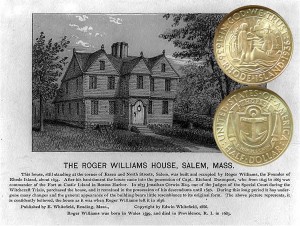Today, the Rhode Island Commemorative Silver Half Dollar Coin tells the story of the arrival of the Lyon 384 years ago.
Arriving on the ship Lyon, Roger Williams and his wife Mary greeted the New World and a colony facing many hardships.
In the History of Massachusetts, Thomas Hutchinson wrote of the Puritan colonists and their struggles in the bitter cold in 1630-31:
” The weather held tolerable until the 24th of December, but the cold then came on with violence. Such a Christmas eve they had never seen before.
“From that time to the 10th of February their chief care was to keep themselves warm, and as comfortable, in other respects, as their scant provisions would permit.
“The poorer sort were much exposed, lying in tents and miserable hovels, and many died of the scurvy and other distempers.
“They were so short of provisions, that many were obliged to live upon clams, mussels, and other shell fish, with ground nuts and acorns instead of bread.
“One that came to the Governor’s house, to complain of his sufferings, was prevented, being informed that even there the last batch was in the oven.
“Some instances are mentioned of great calmness and resignation in this distress.
“A man who had asked his neighbor to a dish of clams, after dinner returned thanks to God, who had given them to suck of the abundance of the seas, and of treasures hid in the sands.
“They had appointed the 22d of February for a fast; but on the 5th, to their great joy, the ship Lyon, Capt. Peirce, one of the last year’s fleet, returned, laden with provisions, from England, which were distributed according to the necessities of the people.
“They turned their fast into a thanksgiving.”
In his journal, Governor Winthrop recorded the ship’s arrival:
” Feb. 5. The ship Lyon, Mr. William Peirce, master, arrived at Nantasket. She brought Mr. Williams, a godly minister, with his wife, Mr. Throgmorton, Perkins, Ong, and others, with their wives and children, about twenty passengers, and about two hundred tons of goods.
“She set sail from Bristol, December 1 . She had a very tempestuous passage, yet through God’s mercy, all her people came safe, except Way his son, who fell from the spritsail yard in a tempest, and could not be recovered, though he kept in sight near a quarter of an hour; her goods also came all in good condition.”
A couple of centuries later in 1830, Josiah Quincy described the early days of the settlement:
” Where now exists a dense and aggregated mass of living beings and material things, amid all the accommodations of life, the splendors of wealth, the delights of taste, and whatever can gratify the cultivated intellect, there were then only a few hills, which, when the ocean receded, were intersected by wide marshes, and when its tide returned, appeared a group of lofty islands, abruptly rising from the surrounding waters. Thick forests concealed the neighboring hills, and the deep silence of nature was broken only by the voice of the wild beast or the bird, and the war whoop of the savage.
“The advantages of the place were, however, clearly marked by the hand of nature; combining at once, present convenience, future security, and an ample basis for permanent growth and prosperity. Towards the continent it possessed but a single avenue, and that easily fortified. Its hills then commanded, not only its own waters, but the hills of the vicinity. At the bottom of a deep bay, its harbor was capable of containing the proudest navy of Europe; yet locked by islands and guarded by winding channels, it presented great difficulty of access to strangers, and, to the inhabitants, great facility of protection against maritime invasion; while to those acquainted with its waters, it was both easy and accessible. …”
Though he found initial greetings and welcome, Roger Williams soon became ostracized for his differing beliefs.
Oddly, those early Puritans left England because of persecution, yet they held narrow beliefs and did not accept those who were different.
After moving among the several towns of Massachusetts, Roger Williams founded Providence, Rhode Island where he advocated religious freedom.
In his treatise, The Bloudy Tenent of Persecution, for Cause of Conscience, Discussed in a Conference Between Truth and Peace, 1644, Williams wrote:
“God requireth not an uniformity of Religion to be inacted and inforced in any civill state…true civility and Christianity may both flourish in a state or Kingdome, notwithstanding the permission of divers and contrary consciences, either of Jew or Gentile.”
For his efforts toward religious freedom, historians remember Roger Williams as the pioneer of soul liberty.
The Rhode Island Commemorative Silver Half Dollar Coin shows against a background of the house in Salem, Massachusetts where the Williams family lived for a short time.
